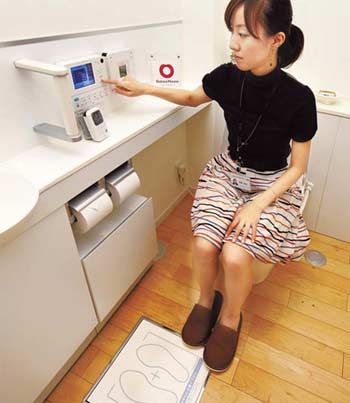|
 An employee of Japan's housing company Daiwa House demonstrates the company's latest model, called "Intelligence Toilet", manufactured by Toto, at Daiwa House show room in Tokyo. [Agencies] |
|
In Japan, the global leader in high-tech toilet design, the latest restroom marvel should come with a health warning for hypochondriacs -- it doubles as a medical lab that can really spoil your day. Japanese toilets have long and famously dominated the world of bathroom hygiene with their array of functions, from posterior shower jets to perfume bursts and noise-masking audio effects for the easily-embarrassed. The latest "intelligent" model, manufactured by market leader Toto, goes a step further and isn't for the faint-hearted: it offers its users an instant health check-up every time they answer the call of nature. Designed for the housing company Daiwa House with Japan's growing army of elderly in mind, it provides urine analysis, takes the user's blood pressure and body temperature, and measures their weight with a built-in floor scale. "Our chairman had the idea when he was at a hospital and saw people waiting for health checks. He thought it would be better if they could do the health tests at home," says Akiho Suzuki, an architect at Daiwa House. Toto's engineers developed a receptacle inside the basin to collect the urine for sugar content and temperature checks, and an armband to monitor blood pressure. The readout is displayed on a wall-mounted computer screen. "With the current model, your data is sent automatically to your personal computer, and then you can email it to your doctor," said Suzuki. "In the next generation model, the data will be sent automatically to family members or doctors via the Internet," she said. The electronic marvel, called the "Intelligence Toilet", is capable of storing the data of up to five different people and retails for 350,000 to 500,000 yen (about 4,100 to 5,850 dollars) in Japan, she said. "For now our customers are essentially middle-aged and senior people. But we hope the young generation will also become more health-conscious." The model is the latest advance in a string of sophisticated toilets, known as "washlets" in Japan, which have become ubiquitous in recent decades. (Read by Nelly Min. Nelly Min is a journalist at the China Daily Web site.) (Agencies) |
作为高科技马桶设计方面的全球领先者,日本最新设计的一款马桶能为那些怀疑自己生病的人敲响健康警钟,不过这款兼有身体检查功能的马桶真的会让你郁闷一整天。 长期以来,日本在卫生洁具方面一直处于世界领先地位,其所设计的马桶因功能多样化而闻名于世,这其中包括背部淋浴喷头、香水喷洒装置以及掩盖人们在上厕所时发出尴尬声音的遮音工具等。 这款最新的“智能”马桶模型由知名卫具公司东陶公司制造,其功能上又有新突破,但不适合胆小者使用:因为这款马桶每次都会对如厕者进行一次即时身体检查。 这款马桶为房产公司大和房建设计,考虑到日本日益壮大的老年人队伍,这款马桶兼有尿液分析、为使用者量血压和体温,并用其内置地秤位为使用者测量体重等多项功能。 大和房建的建筑师铃木明步说:“我们的老板在一家医院看见人们排队等待体检时产生了这一想法,他觉得如果人们能在家就做体检会更方便。” 东陶公司的工程师们在马桶上安装了一种尿液收集器,用于检测血糖和体温,以及监控血压的臂带。检查结果会在安装在墙上的电脑屏幕上显示出来。 铃木说:“目前的模型能将你的数据自动传输到你的个人电脑上,然后你可以通过电子邮件发送给你的医生。” 她说:“下一代模型则能将数据自动通过网络发送给你的家庭成员或医生。” 她说,这一被称为“智能马桶”的电子卫具能够储存五个人的数据,目前在日本的零售价格为每套35万到50万日元(合4100到5850美元)。 “目前我们的顾客主要是中老年人。不过我们希望年轻人也能更加重视自己的健康。” 这一模型是日本高科技马桶系列“卫洗丽”的一款最新产品,近几十年来,“卫洗丽”产品在日本已经相当普及。 相关阅读 (中国日报网英语点津 陈丹妮 编辑:蔡姗姗) |
|
Vocabulary: hypochondriac: a person who suffers from hypochondria; hypochondria is a state in which somebody worries all the time about their health and believes that they are ill when there is nothing wrong with them(疑病患者) posterior: the part of your body that you sit on; your bottom(臀部;屁股) faint-hearted: lacking confidence and not brave; afraid of failing(胆怯的;怯懦的) answer the call of nature: 上洗手间 washlet: 自动喷水马桶,卫洗丽 ubiquitous: seeming to be everywhere or in several places at the same time; very common(似乎无所不在的;十分普遍的) |
